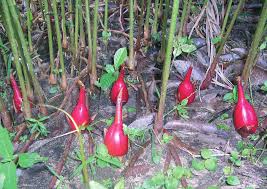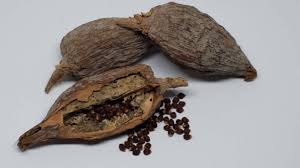![]()
If you’ve landed on this article page, you’re probably searching for a
good business idea—an idea that’s light on the pocket but heavy on
returns, promising both a fulfilling journey and potential profit.
|
How to start a lucrative Alligator
Farming Business in Nigeria
Alligator
Pepper is a prized crop in Nigeria, grown mainly in the
southwest and southeast regions. It thrives in humid rainforests
with well-drained, sandy soil. Farmers carefully nurture the
shrubs, harvesting the seeds by hand when they turn deep red.
This meticulous process ensures top quality for both local
consumption and export.
Alligator Pepper is woven into the rich tapestry of Nigerian
culture. It features prominently in ceremonies like weddings and
naming rights, symbolizing strength, resilience, and good
fortune. Stories and proverbs abound, celebrating its fiery
spirit and diverse uses.
Economic Spice: Alligator Pepper is a valuable export commodity
for Nigeria, bringing in a significant amount of revenue. Its
demand is growing globally, thanks to its unique flavor and
potential health benefits. This creates economic opportunities
for farmers and boosts the country's agricultural sector.
This plant has lanceolate leaves up to 9" long. The
trumpet-shaped, purple flowers develop into 5 - 7 cm long
grayish - brown, wrinkled dried pods (capsules) containing the
numerous very small seeds. These are almost oval in shape, hard,
shiny, and have a reddish-brown color.
The important parts of this plant are the seeds and rhizomes;
the small (3-4 mm =1/8") reddish - brown seeds have a pungent
aroma with a pepper - like heat.
This much sought after spice is tempered with, among others,
flavors reminiscing of hazelnut, butter and citrus.
Seed Preparation:
Extract seeds from ripe pods. Dry the seeds under shade for a
few days to reduce moisture content.
Planting Process:
Dig holes 2–3 cm deep, spaced about 1 meter apart.
Place one seed in each hole and cover it with a thin layer of
soil.
Spacing: Maintain 1–1.5 meters between rows to give plants ample
room to grow.
Water the seeds immediately after planting.
Continue watering regularly, especially during the dry season,
to keep the soil consistently moist. Avoid overwatering, which
can cause root rot.
Apply Manure
Use organic manure such as compost or well-rotted poultry
droppings to enrich the soil.
Apply manure every 2–3 months during the growing period to
promote healthy growth.
Maturity and Harvest
Alligator pepper plants take about 8–12 months to mature,
depending on environmental conditions.
Signs of maturity include:
Development of bright golden pods.
Pods split open to reveal seeds when fully ripe.
Harvest the pods by cutting the stalks carefully to avoid
damaging the plant.
Dry the harvested pods under shade before extracting the seeds.
Pest and Diseases
While alligator pepper is relatively resilient, it is
susceptible to certain pests and diseases, including:
Pests:
Grasshoppers and caterpillars feed on the leaves.
Nematodes can attack the roots.
Diseases:
Fungal infections, such as leaf spots and root rot, are caused
by poor drainage.
Pest and Disease Control
To protect your alligator pepper plants:
Cultural Practices:
Practice crop rotation to prevent nematode buildup.
Ensure proper drainage to avoid fungal infections.
Natural Remedies:
Use neem oil or garlic spray to deter pests.
Chemical Control:
Apply appropriate pesticides or fungicides as recommended by
agricultural experts.
Regular Monitoring:
Inspect plants weekly for signs of pests or diseases, and take
immediate action if detected.
How Many Alligator Pepper Plants Can I Grow on a 50ft by 100ft
Plot of Land?
A plot of 50ft by 100ft (approximately 465 square meters) can
accommodate about 200–250 alligator pepper plants, depending on
spacing.
The yield of alligator pepper depends on the number of plants
and farming practices. On average:
A single plant can produce 10–15 pods annually.
With 200 plants, you can harvest approximately 2,000–3,000 pods
per year.
The seeds from these pods typically weigh about 15–20 kg,
depending on pod size.
With proper care and management, this rewarding crop can provide
significant economic and cultural value.
The Export Process:
Turning passion into profit requires some legwork. To export
Alligator Pepper from Nigeria, you'll need to navigate a few key
steps:
Registration: Get registered with the Nigerian Export Promotion
Council (NEPC) and obtain an Export Certificate.
Packaging and Labeling: Package your Alligator Pepper
professionally, adhering to international labeling regulations
and highlighting its unique qualities.
Finding Buyers: Research potential markets and connect with
international buyers through trade shows, online platforms, or
specialized export agents.
Regulations and Challenges: While the process might seem
daunting, remember, it's all about ensuring food safety and
quality. Challenges like meeting stringent international
standards, fluctuating global market prices, and competition
from other pepper varieties can arise. But persistence and
strategic planning can pave the way for success.
The demand for Alligator Pepper has been steadily rising in
recent years. This can be attributed to:
Growing global interest in African cuisine: Sparking curiosity
about unique ingredients.
Awareness of potential health benefits: Studies suggest
anti-inflammatory and digestive properties.
Demand for natural and organic products: Aligning with consumer
preferences for clean ingredients.
Get our Practical Training Guide on Alligator Pepper Farming in
Nigeria. We will provide you with proper insight into successful
Alligator Pepper farming. This guide covers all aspects of
establishing new Alligator orchards
or expanding existing farms, from suitable varieties and site
selection to soil management, pest control, harvesting best
practices.
|







